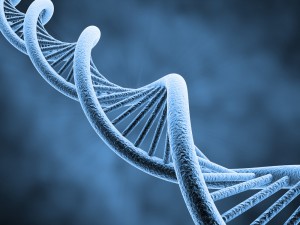
One of the first lectures I attended at Medical School was an introduction to the “nature vs. nurture” debate. I recall the general consensus was a bit of both, however it wasn’t until many years later and well into my public health career that I began to see the value of this perspective in improving population health.
It’s all very well to recognise that if we could only improve the living environment then everyone would be healthy and happier, however the principles of public health genetics as defined by the Centre for Disease Control (CDC, 2013) specifically recognise the importance of the interaction between genes and behaviour – we must address the holistic nature of illness and health, medicine and salutogenesis (promoting health and well-being rather than treating illness) if we are to make the most of this emerging and expanding field.
Wichers et al have contributed to the debate with their 2012 study of the causal inter-relationship between negative life events and depression in female twins (Wichers, 2012).
Methods
536 adult female twins from an ongoing population twin study were selected. These studies are generally subject to various biases, particularly selection and volunteer biases, however this is probably as good as it’s going to get in this field of epidemiology and provides a good subject base.
The women were questioned on a series of lifetime events (including relationships, work, health, bereavement etc.) based on a standard list and followed up four times at 3 to 4 month intervals. These were rated on a five-point scale from very pleasant to very unpleasant. Depressive symptoms were also measured at the same time using a standard checklist. Best-fit models were constructed to describe the relationships found between negative life events and depression scores.
Results

Your genes make you more likely to suffer from clinical depression by determining your psychological and cognitive makeup
The study itself is complex and certainly tested my residual knowledge of medical genetics. Once I had exercised my brain a little I understood the following:
Put simply, there are two ways by which your genetic make up can dictate whether or not you experience depressive symptoms.
- (“Outside the skin”). Your genes can create an environment that exposes you to negative life events, for example making you make bad life decisions, or having a stubborn or chaotic personality
- (“Inside the skin”). Your genes make you more likely to suffer from clinical depression by determining your psychological and cognitive makeup
This is maybe a little simplistic as ultimately the relationship between life events and depressive symptoms was shown to be complex and bi-directional. Nonetheless, from a public health perspective principles such as these generally have more utility than the minutiae. If we set aside the deeper scientific findings, it might also be useful to policy makers to consider these findings in the more dogmatic, recognised phenotypic context where:
- Reducing exposure to negative life events would reduce the incidence of depressive symptoms
- Lowering depressive symptoms would decrease the occurrence of negative life events.
Bear with me!
As ever, we must ask ourselves “so what”? What does this mean, if anything, for healthcare and/or public health? Can we use these findings? Can we apply them? Do we just say this is very interesting but we await something we can do something with? Its not unreasonable that so many studies add the coda “more research is needed”, after all not many advances are made in Eureka moments, most follow a systematic and incremental research path which consolidates the key clinical elements of efficacy/effectiveness and safety (a la Phase 1/2/3/4 clinical trials).
So, so what?
If we put together the four points outlined above, we could surmise that three population level approaches might provide an evidence-based synergy, albeit one whose practical utility probably lies some years in the future:
- Tackling existing socioeconomic inequalities will deliver a population with minimised “depression-causing” environmental factors
- The continuing and widened use of evidence-based therapies for depression will reduce both the prevalence of depression and its associated morbidity
- Genetic approaches to identifying a high-risk cohort could open an avenue that fits the population screening paradigm – this is clearly an area with a relatively minimal evidence base and which would face considerable ethical and moral debate and resistance, clearly not one for the here and now
Two final points

The relationship between deprivation and depression is not as simple as it may first seem.
- As ever, we must be careful to observe the ecological fallacy – not to draw definitive causal inferences from correlational data.
- A fascinating perspective of this issue in respect of frontline healthcare was provided by Chew-Graham et al in a Family Practice paper in 2002 (Chew-Graham, 2002). Whilst looking at diagnosis rates for depression in primary care in North West England, the authors concluded that many GPs were simply avoiding the issue by surmising that anyone who lived in such a socioeconomically deprived environment might be expected to be down in the dumps. However, all GPs saw depression as a reaction to life events, regardless of socioeconomic status, but conventional interventions were felt to be of limited effectiveness in areas of higher deprivation – all in the face of strong evidence that the true prevalence of depression is inversely proportional to affluence.
Links
- M. Wichers, H. H. Maes, N. Jacobs, C. Derom, E. Thiery and K. S. Kendler (2012). Disentangling the causal inter relationship between negative life events and depressive symptoms in women: a longitudinal twin study. Psychological Medicine,42, pp 18011814 doi:10.1017/S003329171100300X [PubMed abstract]
- Public Health Genomics 2013 At a Glance: Realizing Opportunities for Genomics to Improve Health, CDC website (accessed 6th May 2013).
- Chew-Graham, C. A., Mullin, S., May, C. R., Hedley, S., & Cole, H. (2002). Managing depression in primary care: another example of the inverse care law? (PDF) Family practice, 19(6), 632–637.


Nature vs. nurture: the case of depression. How do your genetic make up and life experiences affect your chanc… http://t.co/LJ8FymFQc9
Read this knock-out debut blog from @Andy54321 Nature vs. nurture: the case of #depression http://t.co/Qx3NAtQb7D
Nature vs. nurture: the case of depression » The Mental Elf http://t.co/MLc9qppsKZ
#Nature vs. #nurture: the case of #depression http://t.co/rZ1YVivM5f #mentalhealth
An analysis of a recent study looking at the nature vs nurture question in #depression by @Andy54321 on @Mental_Elf http://t.co/0dydkilugG
How do your #genetic make up and life experiences affect your chances of developing #depression ? http://t.co/Qx3NAtQb7D
@Andy54321 blogs a recent longitudinal twin study about negative life events & depression in women http://t.co/Qx3NAtQb7D
Nature vs nurture: How ur genetic makeup and life experiences impact risk of #depression #mentalhealth http://t.co/oC5beuxKxu
what an absoulute amazing artical explained to a level of understanding yet obtaining the scientific rules and terminology. da iawn. (im welsh)